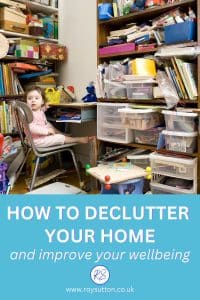Introduction:

You may feel you would like more money in your pocket, but have you ever asked yourself the philosophical question, “How much money is enough?”
If you ask a billionaire, the response is likely to be that no amount is enough. Let’s face it, they become billionaires because they’re constantly driven to make money.
However, other people might modestly settle for, say, $1 million.
People who are a little more thoughtful might give you a different number, somewhere between the two extremes, possibly.
The cost of chasing money:
We all need money, and we all want a decent standard of living.
However, always remember that there is a cost to chasing money. And that cost, among other things, is the impact it has on your time.
We can get more money, but we can never get more time. We all get 168 hours each week, and that’s it.
So, there comes a point where there might be a better way to spend your time than to chase more money.
And you’ll never know if you’ve reached that point if you don’t define it.
Achieving happiness:
Studies have shown that happiness doesn’t increase beyond an income of around $70-80k per year.
That might seem modest, but it’s probably a comfortable living in most parts of the country.
However, it’s not enough to drive a new Mercedes every three years and vacation in Europe with the family every summer.
It would be tough to send your child to Harvard on a $70,000 salary.
So, ask yourself, How much is enough?
The answer is that it all depends on you and your circumstances.
Factors to consider:
To consider how much you need to live fully, think about the following:
1. Age
How old are you?
How much longer can you reasonably expect to live?
If you’re 90, you probably require less money for the rest of your life than people in their 20s and 30s.
There are actuarial tables that can tell you how much longer you’re expected to live. However, you should plan to live longer than expected!
You will find an example of actuarial tables HERE and you might find this useful.
2. Expenses
How much are your monthly expenses?
What would your expenses be if you were living the life of your dreams?
Let your imagination run wild. What expenses would you have?
A new bowling ball each year or a second house in Vail, Colorado? A housekeeper? A thoroughbred racehorse?
It’s your life. Determine how much it would take to finance what you think is your ideal life.
3. Dependents
Who are you responsible for?
Do you have three children who will attend college in the next 10 years?
Do you have a spouse who doesn’t work?
Do you care for an ageing parent or parents?
For how long do you expect to have responsibility for financially providing for others?
Ultimately, you must consider every potential demand on your wallet or purse.
4. Debt
What is your current debt situation?
Do you have 20 years left on a mortgage hanging over your head?
Significant medical bills?
Credit card debt to repay?
Debt must be financed, and repayments must be made. So, you can’t ignore debt.
5. Retirement
None of us can go on forever. At some point, we must all take life at a slower pace.
So, when would you like to retire, and how much do you need each month to live comfortably?
How would you like to spend your retirement?
Do you want to travel regularly?
Play golf every day?
How much would a typical month in your ideal lifestyle retirement cost?
6. Lifestyle
What toys do you want to own? And by that, I mean serious toys.
A plane? A Porsche? A boat? A holiday home in Aspen or Tuscany? Swimming pool? Motorcycle?
If they give you pleasure, then it’s reasonable to work towards owning them
Then again, maybe you value your free time above all else and would be happy living a simple life with a Labrador retriever and a large vegetable garden, reading books all afternoon.
The choice is yours. Equally, you can go as far as your imagination will take you.

Affiliate Disclosure: Commission received for purchases made via the link. There is no additional charge to the purchaser. Thank you for your support.
For everyone, it’s different:
There are no right or wrong answers to the question, “How much money is enough?“
Everything depends on your desires and circumstances.
The number for you might be quite small or very high.
It’s just your number. It’s personal, that’s all.
If you’ve never considered how much money you need, then take the time to think about it.
Money in perspective:
Having money and financial freedom is great for a couple of things, in particular solving problems and providing choices.
However, beyond that, it has limited value.
Certainly, it’s a mistake to use money to establish status. Worrying about impressing your peer group should be left to teenagers.
Needing money for the wrong things is limiting. It requires working longer and harder than necessary.
You could be doing other things with your limited time on Earth.
Conclusion:
Think long and hard about what is most important to you.
Ensure that you develop an income, savings, and net worth to acquire the possessions and freedom that will allow you to live your life the way you desire.
Spend time addressing this important issue, and you might be able to quit working sooner than you think.
However, have money in your head but never in your heart.
And never let your pursuit of money prevent you from spending time with family and friends.
A lonely old age would be a heavy price to pay for wealth creation.
There is little point in being the richest person in the graveyard with no one to mark your passing.
And never, ever forget to spend at least some of your time enjoying yourself. As we say where I come from, you’ll be a long time dead!

About the author:
Roy Sutton is an experienced blogger whose main website has generated more than 350,000 page views per month. Before becoming a blogger, he was a businessman and CEO of a national telecom operator and had a professional background in telecom systems and information technology.
Other articles you might find interesting:
- How to Become Wealthy in 5 Years: A Roadmap for Growth
- How to become a digital nomad: 10 steps to freeing your soul
- 50 ways to make some extra cash
- How to become a Virtual Assistant
- 3 things you need to know about money
- Work and Money: Which is more important?
- Turn your yearly income into your monthly income
- 3 ways for getting rich
- How to become rich through your work
- 5 ways to kill your dreams
- 33 life lessons learned that are best learned early
- How the power of words can change lives
- 10 steps for making new year’s resolutions
- Public Speaking: The Power of the Pause
- Productivity Tips: How to Structure Your Day
- George Carlin’s Top 10 Rules For Success
- Top wealth creation strategies for financial success
- Why an investment in knowledge pays dividends
You might like to try these free games too:
- Chess online free
- Checkers online free
- Backgammon online for free
- Word Search online free
- Sudoku free online
- Minesweeper online free
Copyright © Mann Island Media Limited 2024. All rights reserved.




